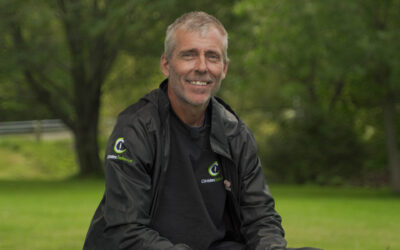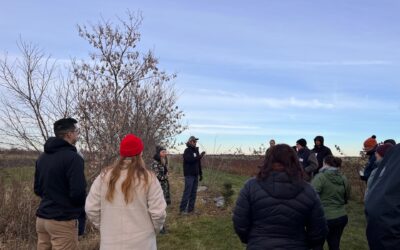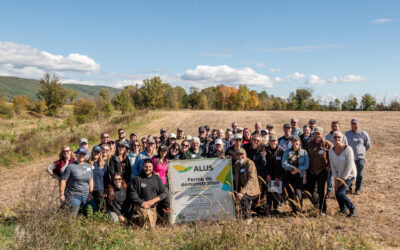Philanthropic funding for climate change-related initiatives remains low at approximately 2% of global giving despite increasing severe climate-related weather events like wildfires, drought and flood. Echo Bay Sustainability Fund wants to help change that—starting with ALUS as their first funding recipient.
Will, his wife Cheryl and his brother Steve founded the Echo Bay Sustainability Fund in 2023 to support climate change solutions that are less likely to generate conventional returns on investment. “We want to fund solutions that remove carbon from the air, while also solving a broader set of problems,” says Will.
Long-term technology solutions, like carbon capture, will generate economic interest and pay for itself. But the work that needs to be done concurrently to mitigate climate risk and protect communities, like conserving and restoring nature to generate natural capital, sequester carbon, and build ecosystem resilience—activities that don’t typically generate market interest—will require greater engagement from the philanthropic community.
Even when philanthropic giving is focused on advancing climate solutions, funding for nature conservation remains low. The top climate-related sectors receiving funding, according to a 2023 report by ClimateWorks, include clean electricity and the decarbonization of transportation and industry.
ALUS is the first organization to receive funding from the Echo Bay Sustainability Fund. A tour of YU Ranch, one of the first official ALUS demonstration farms in Norfolk, Ontario, was enough to convince Will that ALUS could deliver solutions that support the Fund’s mission. The farm’s nature-based projects, like restored grassland prairie, were tangible and visible: “It was a very clear illustration of biodiversity,” recalls Will. “You can see the impact.”
The other draw was the uniqueness and scalability of the ALUS program. As a former tech entrepreneur, Will admired the effectiveness of ALUS’ decentralized model and its ability to provide structured support to its communities and attract corporate investment to fund on-the-ground climate action.
ALUS is a charitable organization that offers communities a turnkey program that engages and financially supports farmers and ranchers in establishing nature-based projects on marginal areas of their lands. ALUS provides communities with program delivery and technical support, as well as allocates funding from public, private and philanthropic sources. The decentralized model embeds program delivery and decision-making power within communities to ensure solutions are suitable to local conditions and designed to address local environmental challenges.
“We just really liked that ethos,” says Will. “We’re excited by organizations that build self-perpetuating environmental remediation and sustainability solutions. ALUS delivers an amazing amount of impact for each dollar invested in large part because they are solving real world problems for farmers, while also impacting carbon, water quality, and biodiversity in an integrated fashion.”
The funding provided by Echo Bay Sustainability Fund contributed to ALUS’ expansion across Canada in 2023-24, as well as supported ALUS’ carbon quantification work, which is critical for driving investment in nature-based climate solutions.
“As a charitable organization, funding that can support capacity building, talent acquisition, program delivery and quantification research is critical to advancing the work we do at the national level and on the ground in our communities,” says Bryan Gilvesy, CEO, ALUS. “We’re grateful to work with entrepreneurial foundations like the Echo Bay Sustainability Fund who recognize the proven effectiveness and scalability of the ALUS model to deliver real, tangible solutions to climate change.”
The ALUS program is currently delivered in 39 communities across Canada. These communities supported farmers and ranchers in adding over 8,600 new acres of nature to the working landscape in 2023, a 22% increase in project acre delivery over 2022. Over 1,700 ALUS farmers and ranchers now actively manage and maintain over 52,000 acres of nature-based projects.



